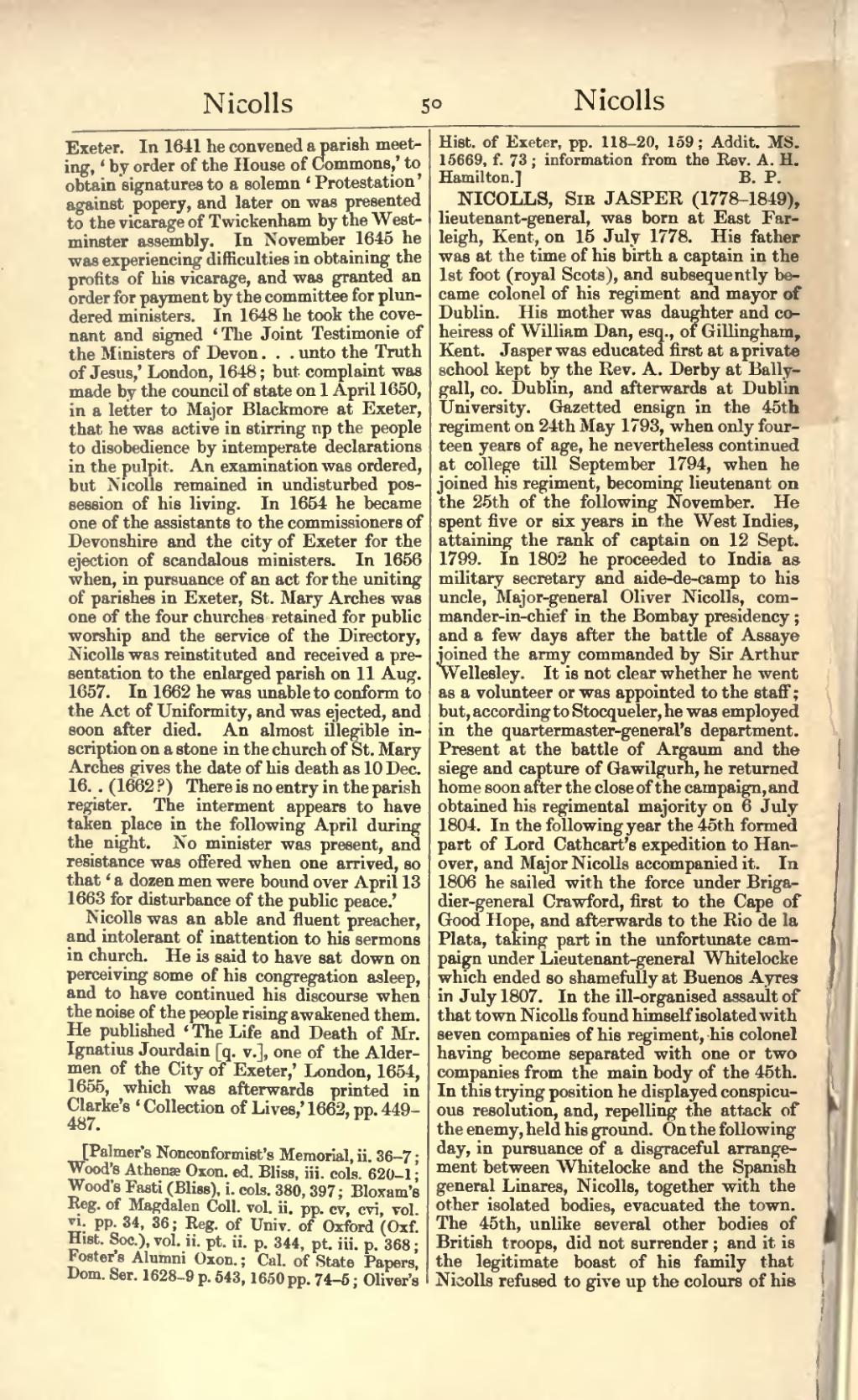Exeter. In 1641 he convened a parish meeting, ‘by order of the House of Commons,’ to obtain signatures to a solemn ‘Protestation’ against popery, and later on was presented to the vicarage of Twickenham by the Westminster assembly. In November 1645 he was experiencing difficulties in obtaining the profits of his vicarage, and was granted an order for payment by the committee for plundered ministers. In 1648 he took the covenant and signed ‘The Joint Testimonie of the Ministers of Devon … unto the Truth of Jesus,’ London, 1648; but complaint was made by the council of state on 1 April 1650, in a letter to Major Blackmore at Exeter, that he was active in stirring up the people to disobedience by intemperate declarations in the pulpit. An examination was ordered, but Nicolls remained in undisturbed possession of his living. In 1654 he became one of the assistants to the commissioners of Devonshire and the city of Exeter for the ejection of scandalous ministers. In 1656 when, in pursuance of an act for the uniting of parishes in Exeter, St. Mary Arches was one of the four churches retained for public worship and the service of the Directory, Nicolls was reinstituted and received a presentation to the enlarged parish on 11 Aug. 1657. In 1662 he was unable to conform to the Act of Uniformity, and was ejected, and soon after died. An almost illegible inscription on a stone in the church of St. Mary Arches gives the date of his death as 10 Dec. 16. (1662?). There is no entry in the parish register. The interment appears to have taken place in the following April during the night. No minister was present, and resistance was offered when one arrived, so that ‘a dozen men were bound over April 13 1663 for disturbance of the public peace.’
Nicolls was an able and fluent preacher, and intolerant of inattention to his sermons in church. He is said to have sat down on perceiving some of his congregation asleep, and to have continued his discourse when the noise of the people rising awakened them. He published ‘The Life and Death of Mr. Ignatius Jourdain [q. v.], one of the Aldermen of the City of Exeter,’ London, 1654, 1655, which was afterwards printed in Clarke's ‘Collection of Lives,’ 1662, pp. 449–487.
[Palmer's Nonconformist's Memorial, ii. 36–7; Wood's Athenæ Oxon. ed. Bliss, iii. cols. 620–1; Wood's Fasti (Bliss), i. cols. 380, 397; Bloxam's Reg. of Magdalen Coll. vol. ii. pp. cv, cvi, vol. vi. pp. 34, 36; Reg. of Univ. of Oxford (Oxf. Hist. Soc.), vol. ii. pt. ii. p. 344, pt. iii. p. 368; Foster's Alumni Oxon.; Cal. of State Papers, Dom. Ser. 1628–9 p. 543, 1650 pp. 74–5; Oliver's Hist. of Exeter, pp. 118–20, 159; Addit. MS. 15669, f. 73; information from the Rev. A. H. Hamilton.]
NICOLLS, Sir JASPER (1778–1849), lieutenant-general, was born at East Farleigh, Kent, on 15 July 1778. His father was at the time of his birth a captain in the 1st foot (royal Scots), and subsequently became colonel of his regiment and mayor of Dublin. His mother was daughter and coheiress of William Dan, esq., of Gillingham, Kent. Jasper was educated first at a private school kept by the Rev. A. Derby at Ballygall, co. Dublin, and afterwards at Dublin University. Gazetted ensign in the 45th regiment on 24th May 1793, when only fourteen years of age, he nevertheless continued at college till September 1794, when he joined his regiment, becoming lieutenant on the 25th of the following November. He spent five or six years in the West Indies, attaining the rank of captain on 12 Sept. 1799. In 1802 he proceeded to India as military secretary and aide-de-camp to his uncle, Major-general Oliver Nicolls, commander-in-chief in the Bombay presidency; and a few days after the battle of Assaye joined the army commanded by Sir Arthur Wellesley. It is not clear whether he went as a volunteer or was appointed to the staff; but, according to Stocqueler, he was employed in the quartermaster-general's department. Present at the battle of Argaum and the siege and capture of Gawilgurh, he returned home soon after the close of the campaign, and obtained his regimental majority on 6 July 1804. In the following year the 45th formed part of Lord Cathcart's expedition to Hanover, and Major Nicolls accompanied it. In 1806 he sailed with the force under Brigadier-general Crawford, first to the Cape of Good Hope, and afterwards to the Rio de la Plata, taking part in the unfortunate campaign under Lieutenant-general Whitelocke which ended so shamefully at Buenos Ayres in July 1807. In the ill-organised assault of that town Nicolls found himself isolated with seven companies of his regiment, his colonel having become separated with one or two companies from the main body of the 45th. In this trying position he displayed conspicuous resolution, and, repelling the attack of the enemy, held his ground. On the following day, in pursuance of a disgraceful arrangement between Whitelocke and the Spanish general Linares, Nicolls, together with the other isolated bodies, evacuated the town. The 45th, unlike several other bodies of British troops, did not surrender; and it is the legitimate boast of his family that Nicolls refused to give up the colours of his

